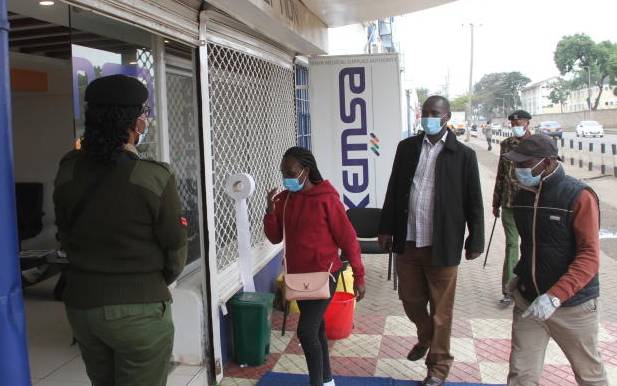
Ethics and Anti-Corruption Commission (EACC) officers raid Kenya Medical Supplies Authority (KEMSA) headquarters at Industrial Area, Nairobi, on September 9, 2020, over corruption allegations. [Edward Kiplimo, Standard]
The Government agency which oversees tenders now says the Kenya Medical Supplies Agency (Kemsa) tenders were flawed.
Public Procurement Regulatory Authority (PPRA) told a parliamentary committee that the tenders regarding Covid-19-related medical supplies could not be saved in the eyes of law and procedure despite their emergency nature.
The agency handed over its final report to the Senate health committee with Director-General Maurice Juma flagging out favouritism in the process.
The report also noted that the procurement process was shrouded in mystery, as Kemsa is yet to provide details of some 23 companies that benefited from the tenders.
Read More
“There is a need for an investigation into the remaining 23 Covid-19-related tenders, which were not submitted by Kemsa to PPRA,” the report stated.
It noted that although the procurement of the required goods was justified, there was no evidence of deliveries by some of the suppliers like Tender No KEMSA/DP69/2019/2020.
The report also showed that most of the contracts were signed after deliveries and there was no evidence of publications and reporting of the contracts.
The report said the interviews of the members of the inspection and acceptance committee revealed that the inspection of the deliveries was conducted after the retrospective procurement process was completed.
No evidence
Despite being a requirement in the tender documents, there was no evidence that the bidders provided the performance security before signing the contracts.
“There was no evidence of reporting of direct procurement above Sh500,000 as required in regulation 62(3) of the PPDR, 2016,” Mr Juma said.
Juma also faulted Kemsa for lacking enough evidence that would back the decisions they made during the process.
The report placed suspended Kemsa CEO Jonah Manjari at the centre of the scandal.
It blamed Dr Manjari for issuing commitment letters instead of tender documents in response to the letters of intent from the bidders.
He said that the publications and reporting of the contract were not done by Kemsa.
“There were no detailed specifications attached to the commitment letters. The tender documents, which were issued to bidders after issuing the commitment letters, were not prepared in the format as provided,” Juma said.
He added: “The CEO did not ensure compliance to the Act in Section 44(1), stating that any accounting officer of a public entity shall be primarily responsible for ensuring that the public entity complies with the law.”
He noted that some suppliers were issued with commitment letters on an emergency basis long before the procurement processes were executed, but there was no evidence they had delivered the required Covid-related items even after the procurement process had been executed and the contracts signed.
Delivered products
The lead investigator of the procurement Francis Kissinger said there was no evidence that the delivered Covid-related health products were received via counter receipt vouchers.
He said their officials were denied access to the relevant documents that they needed in the process of investigation when they visited Kemsa’s Embakasi warehouse on September 3 and 8.
He said although there was evidence of payment for most of the suppliers against invoices and confirmed deliveries, there was no evidence that withholding tax was not deducted during the payment of suppliers.
Although the Ethics and Anti-Corruption Commission had submitted its investigation report, PPRA recommended further investigations into the process through which the tenders were initiated by the Ministry of Health and Kemsa.
Credit: Source link